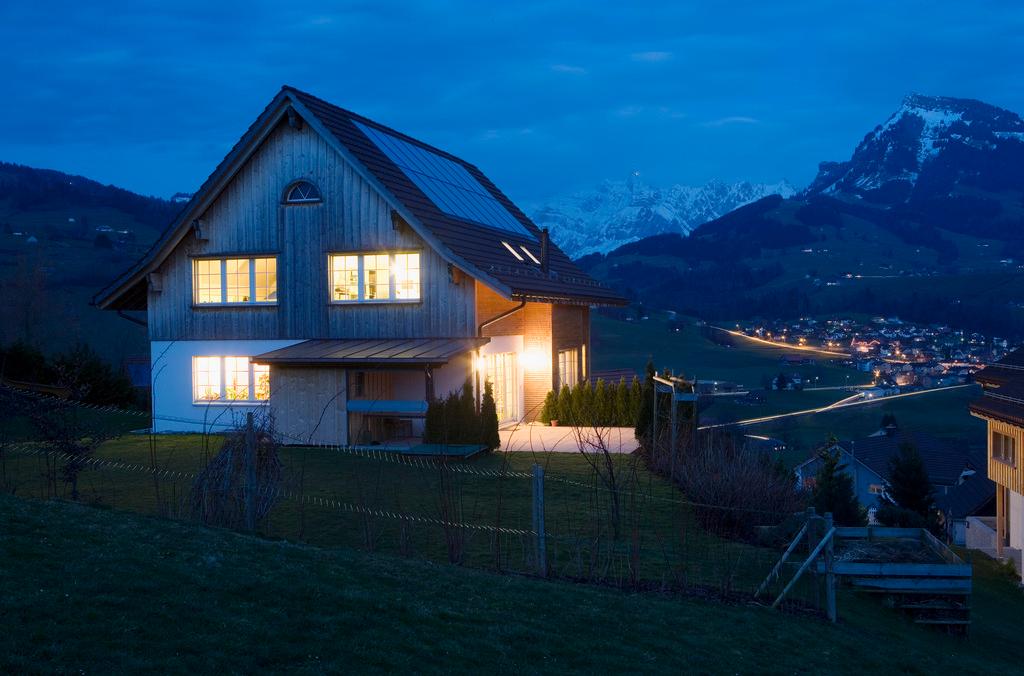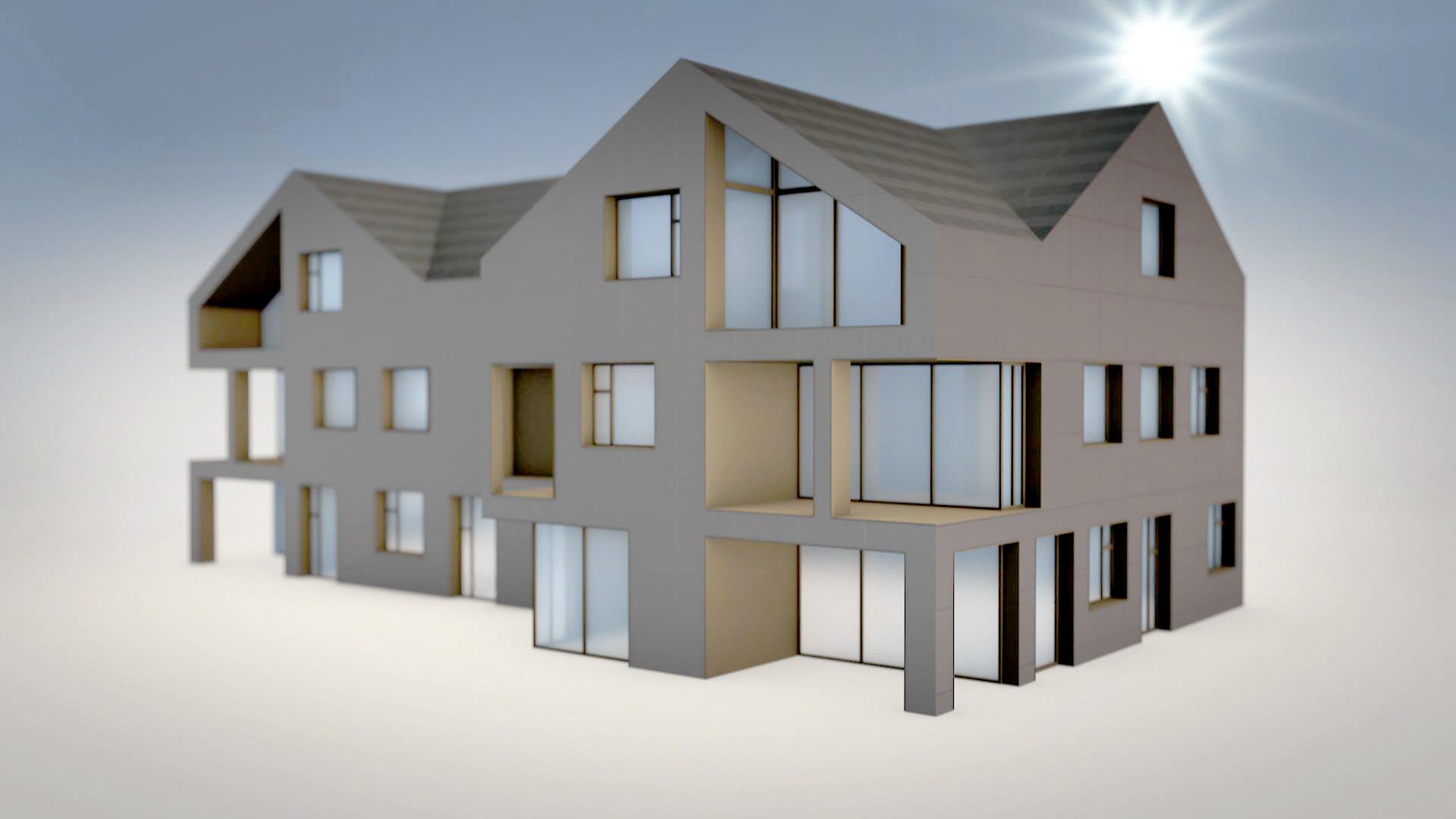
The Swiss houses making energy go a long way

Household CO2 emissions in Switzerland have experts talking. Despite its growing population and the amount of space needed per person, emissions still dropped between 2000 and 2013. How?
A new apartment block in Brütten, canton Zurich dubbed “The House of the Future” is a Swiss energy efficiency case-in-point – although it goes several steps beyond even the thriftiest homes on the ground today. Believed to be the first energy self-sufficient apartment building in the world, the dwelling produces all its own heat and electricity using the sun’s energy, and so does not need to be connected to a power grid.
The building’s surface area is covered in solar panels, and is designed to minimise both energy usage and energy waste. When construction is completed this spring, it should be able to glean 24 hours’ worth of power from just one hour of sunlight.

More
The house that provides its own energy
Despite possessing a back-up system for converting stored solar energy into hydrogen on days when there is insufficient sunlight, tenants will have to keep track of their energy consumption to ensure that it does not exceed what the house can provide.
But that does not seem to have discouraged applicants: Umwelt Arena, the building company behind the project, has already received requests from around 100 would-be tenants-of-the-future for the nine-family building.
“I think the more energy efficient houses there are, the more people understand and the more they naturally think it’s a good thing to do,” says Carol McEowen, a Bern architect specialising in energy efficiency standards.
Energy use affects many different parts of daily life, whether it’s setting the thermostat, running the dishwasher, or opening the window for a breath of fresh air. So how can we best target improvements in energy efficiency?
Switzerland’s population grewExternal link by 1.2% in 2014, and has increased 13% between 2000 and 2013, going from 7.2 million to 8.1 million.
In a recent study, Switzerland’s Federal Statistical Office set out to answer that question by unravelling the different factorsExternal link that influence energy use and CO2 emissions in Swiss households.
The researchers found that thanks to greater household energy efficiency, fossil CO2 emissions from heating Swiss homes declined between 2000 and 2013, despite a 13% increase in the population.
Moreover, without improvements in household energy efficiency, Swiss dwellings would have generated nearly 20% more CO2 as a result of heating than they actually did during the time period studied.
“[The decrease in CO2 emissions] could be due to better insulation, thicker windows, or more environmentally friendly habits, such as people keeping their thermostats at 19C rather than 23C, or not leaving their windows open longer than necessary,” Flavio Malaguerra, the study’s editor, told swissinfo.ch.
Taking responsibility
Although Malaguerra emphasises that the impact of people’s day-to-day energy use habits is extremely difficult to measure accurately, another Federal Statistical Office studyExternal link published in 2015 suggests that energy-consciousness may be on the rise in Switzerland. Of those surveyed, 42% said they “always” considered how their purchases or appliance use affects their electricity consumption, compared with 35% in 2011.
But Roger Nufer, a buildings specialist at the Swiss Federal Office of Energy, thinks otherwise. “Recent studies show that heated floor area per capita has been increasing, which means that more volume has to be heated. This effect goes in the opposite direction of energy improvements to buildings.”
Nufer thinks that heat pumpsExternal link deserve much of the credit for energy savings in new dwellings. A heat pump uses electricity to move heat from the outside of a house to inside – like a reverse air conditioner – rather than generating its own heat, making it highly efficient. Today, there are about 130,000 heat pumps in use in Switzerland, and the Swiss Federal Office of Energy predicts that 400,000 will be in use by 2020.
Heat pumps can also be part of district heatingExternal link systems, which supply heat to a group of dwellings via a centralised heat exchange system.
The old and the new
“District heating is especially important in old cities, where there is a high density of heat consumption and old buildings that might be historically protected, and therefore difficult to retrofit,” says Nufer.
“It can provide renewable heat to a variety of buildings, so that not every building has to run its own renewable solution.”
McEowen thinks that the increase in living space is down to lifestyle factors such as rising wealth, and more two-household families in which each child has his or her own room. “[The decrease in CO2 emissions] has to do with improved building materials as a result of federal government and community efforts to reduce the energy put into heating homes.”
Such efforts include cantonal energy regulations, subsidies used for energy-efficient retrofitting, and the replacement of fossil fuels with renewable energy sources in existing homes.
Consistent with Switzerland’s Energy Strategy 2050External link, the Swiss federal government and the cantons spent over CHF1 billion ($1.01 billion) between 2010 and 2014 on incentive programmes to improve the energy efficiency of existing buildings.
“Switzerland has to be careful about energy use, because other than hydropower, it doesn’t have natural resources that can produce energy,” says McEowen. “The Swiss government has to ensure energy is always available for its citizens, and because of that, they have actively sought to understand energy use and find out ways to control or reduce it.”
A study commissioned by the Swiss Federal Office of Energy on energy efficient buildings reveals that not all end up meeting energy targets. Around 200 buildings meeting energy efficiency norms – like the Minergie certification – were assessed for energy consumption.
While individual houses generally performed well, the majority of new or modified collective housing units failed to obtain the energy savings expected. The under performance was attributed to improper functioning or use, as well as low heating efficiency. The study revealed that a significant amount of promised energy savings depends on the behaviour of inhabitants.
Those living in such buildings also complained of the air being too dry, especially in winter.
Fossil carbon dioxide (CO2) emissions are produced when fossil fuels like gas, coal or oil are burned for energy. Carbon dioxide in the atmosphere can prevent the sun’s rays from leaving the earth’s surface, trapping them inside and raising global temperatures.
In 2013, Switzerland emitted approximately 47 million tonnes of fossil CO2 – with just over 40% attributable to household (as opposed to industrial) energy use. Alternatives to fossil fuels, such as solar power; reducing total energy use; and minimising energy loss or waste are all ways to limit fossil CO2 emissions.

In compliance with the JTI standards
More: SWI swissinfo.ch certified by the Journalism Trust Initiative




























You can find an overview of ongoing debates with our journalists here . Please join us!
If you want to start a conversation about a topic raised in this article or want to report factual errors, email us at english@swissinfo.ch.